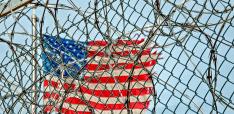Biden’s Big-But-Quiet Policy Victory

Anticipating a second term for Trump, Karl T. Muth argues that some immigration is in the national interest and strategically vital.
I make here the controversial argument that the biggest policy victory of the Biden administration is–and this may surprise you if you’re trapped in the dominant national news cycle–immigration reform. Specifically, an enormous expansion of a kind of immigration that you probably haven’t heard of, but that I argue you should be very much in favor of.
I’m talking about the expanded use of the NIW (National Interest Waiver) framework to bring people into the United States and allow workers already in the United States to remain. The reason I favor this kind of immigration is these are essentially immigrants vetted by systems and institutions that I trust, including top research universities.
So how does it work?
Well, the NIW framework does three things that I like a lot: 1) it decouples the immigrant from the job offer H-1B system of employer sponsored immigration, 2) it focuses on people who are likely to be high-impact immigrants in important fields, and 3) it prevents these people from returning to adversarial labor markets, especially mainland China.
It also does one thing that I like somewhat less: it, in my opinion, does not have sufficient safeguards to screen, identify, and surveil NIW recipients in academia and in the private sector who may have ulterior motives to learn about or actively exfiltrate knowledge gained in U.S. laboratories or U.S. high-tech employers (“labcoat sleeper agents”).
When I talk about NIW workers, I’m talking about a small but important sliver of the labor force; these aren’t people picking strawberries or cleaning office buildings (though those types of immigration are also important), these are foreign nationals who can perform research and/or commercialization of research at the bleeding edge of science.
These are people who might impact “ATYA” tech; this is MIT slang for things that are seemingly (I’m in my forties, for perspective) “Always Twenty Years Away,” things like stable nuclear fusion reactors, room-temperature superconductors, pocket-sized quantum computers, “wetware” brain-to-computer interfaces, and directed-energy man-portable weapons.
Basically, if you have trouble naming ATYA technologies, pick up something by Gibson or Dick or another good sci-fi storyteller; you’ll see all of this has been “right around the corner” for fifty years. But these things are sci-fi until they aren’t; and it’s generally no brogrammers with lots of YouTube subscribers or startups with flashy swag that build this stuff, it’s unsexy work in labs and piles of failed prototypes.
Who’s going to do that work?
Don’t take my soothsaying at face value; let’s look at who USCIS thinks is going to do this work (because that’s who they give the National Interest Waiver to): USCIS may grant a National Interest Waiver if the applicant 1) is working on an endeavor of national importance and substantial merit, 2) is well-positioned to meaningfully advance the endeavor, and 3) is positioned in such a way that it is in the national interest to waive conventional job offer and labor certification requirements.
This third element (see the relevant case In Matter of Dhanasar, 26 I&N Dec. 884 (AAO 2016) for more detail on these elements) is intentionally open-ended and the best piece of this policy, as it keeps immigration flexible to opportunistically poach and retain the kinds of talent our economy needs. Importantly, the burden is on the petitioner to prove these elements (see 8 U.S.C. § 1361 (2012)).
Prior to the Biden administration, occasionally EB-2 applicants (who already must show extraordinary ability in the course of their visa application processes) were occasionally able to avoid the PERM Labor Certification process due to their exceptional ability and the extent to which this demonstrated exceptional ability was congruent with a void in the highly-skilled regions of the US labor market.
During the Biden administration, however, the amount of NIW activity has skyrocketed, and this is an example of using policy to strategically soften US immigration policy in needed and important areas when Congress is paralyzed by schoolyard insult-hurling and election-year posturing. This is a rare glowing “Biden moment” in four years when “Biden moment” was more often either a late-night-show punchline or a dementia euphemism.
However, it isn’t just boffins at Alphabet or Pfizer that are benefiting from this policy; I’d argue society as a whole benefits. For instance, a not-insignificant number of doctors caring for veterans in the VA system are foreign national physicians who are beneficiaries of NIW waivers. And, of course, this highly-skilled, highly-educated immigration is exactly the phenomenon the broader policy mechanisms encourage.
So where is this benefit concentrated in the labor market and who are the losers, if anyone? I’d argue there are really no losers in this policy framework. The increased competition from foreign scientists and physicians is unlikely to be substantial enough in size or scope to have an outsize effect on wages in these areas. The total number of people migrating in this fashion is not large enough to move housing markets or create similar distortions.
Given the tiny (with the global population as the denominator) number of humans able to engage in serious work in areas like artificial intelligence software (including defense-relevant AI), high-performance ASICs (application-specific integrated circuits), fully-synthetic antibiotics (Cilagicin, R327, and their conceptual progeny), small-scale repatriation of such people is in the national interest and strategically vital.
This is especially true as the United States has an education system that suboptimally nurtures randomly-distributed talent; many people born in the US may, in fact, have equal or superior natural aptitudes in relevant areas, but even in America’s wealthiest cities, it is unlikely they will fully realize their potential unless they are raised in resource-abundant environments (see generally J.D. Owen, The Distribution of Educational Resources in Large American Cities, Journal of Human Resources, 26-38 (1972)).
Finally, since the NIW framework does not require an employment offer, it allows the US to look at a large number of PhD students and postdocs who are involved in important work (and already have a growing body of published research) and to “onshore” their professional productivity early in their career arcs rather than this work being done in (and retained by) labs in China or elsewhere.
Of the policies of the Biden administration I fear might change under a second Trump administration, the substantially-broadened use of the NIW framework is in my top three. However, I hope that no matter which party is in power, policymakers recognize the importance of attracting and retaining the most highly-skilled professionals available, as ensuring these people work in the US (and not for adversarial powers) is vital not only to our economy, but to the future of our cities, our companies, our society, and the West’s long-term security.
Karl T. Muth taught Economics, Law, and Public Policy at Northwestern University for over a decade and is now affiliated with both the University of Chicago and the Cambridge Centre for International Research; his comments here do not reflect the views of those institutions or of any of his past or present clients or employers.
Photo by Kevin Ku


